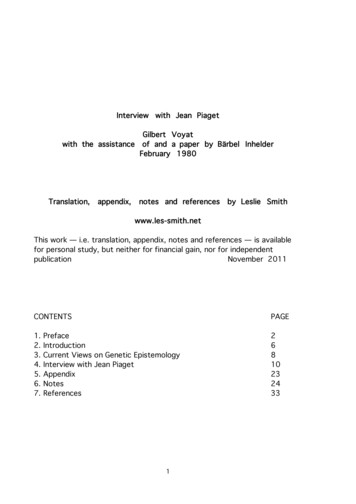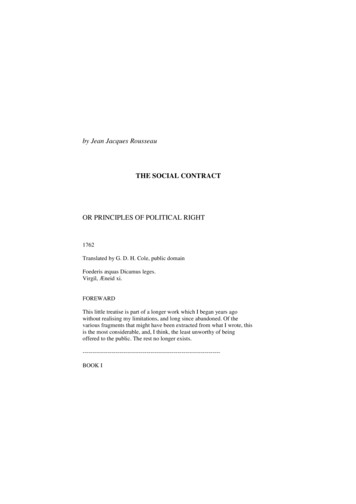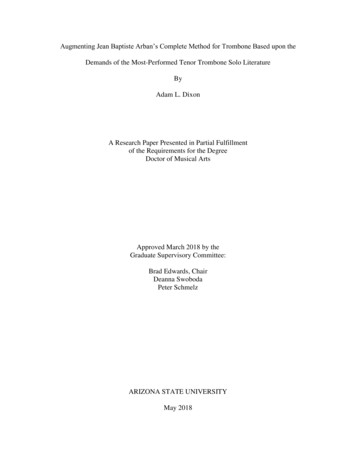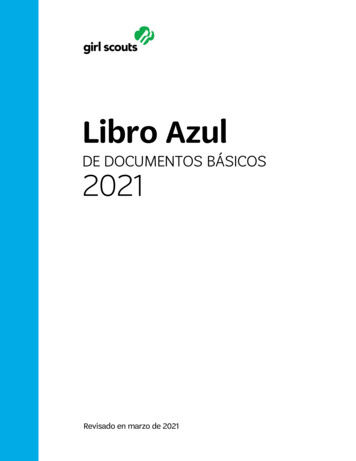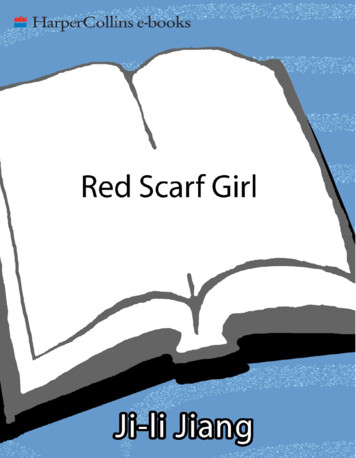
Transcription
Table of ContentsTitle PageCopyright ERHEAD BOOKSPublished by the Penguin GroupPenguin Group (USA) Inc., 375 Hudson Street, New York,New York 10014, USA Penguin Group (Canada), 90 Eglinton Avenue East, Suite700, Toronto, OntarioM4P 2Y3, Canada (a division of Pearson Penguin Canada
Inc.) Penguin Books Ltd,80 Strand, London WC2R 0RL, England Penguin Ireland,25 St Stephen’s Green,Dublin 2, Ireland (a division of Penguin Books Ltd) Penguin Group (Australia),250 Camberwell Road, Camberwell, Victoria 3124,Australia (a division ofPearson Australia Group Pty Ltd) Penguin Books IndiaPvt Ltd, 11 Community Centre,Panchsheel Park, New Delhi-110 017, India PenguinGroup (NZ),67 Apollo Drive, Rosedale, North Shore 0632, NewZealand (a division ofPearson New Zealand Ltd) Penguin Books (South Africa)(Pty) Ltd,24 Sturdee Avenue, Rosebank, Johannesburg 2196, SouthAfricaPenguin Books Ltd, Registered Offices: 80 Strand,London WC2R 0RL, EnglandFirst published in the United States by RiverheadBooks 2010Copyright 2010 by Jean KwokAll rights reserved. No part of this book may bereproduced, scanned, or distributed in any printed orelectronic form without permission. Please do notparticipate in or encourage piracy of copyrighted materialsin violation of the author’s rights. Purchase only authorizededitions.
A CIP catalogue record of this book is available fromthe U.S. Library of Congress.eISBN : 978-1-101-18748-7This is a work of fiction. Names, characters, places, andincidents either are the product of the author’s imaginationor are used fictitiously, and any resemblance to actualpersons, living or dead, businesses, companies, events, orlocales is entirely coincidental.While the author has made every effort to provideaccurate telephone numbers and Internet addresses at thetime of publication, neither the publisher nor the authorassumes any responsibility for errors, or for changes thatoccur after publication. Further, the publisher does not haveany control over and does not assume any responsibility forauthor or third-party websites or their content.http://us.penguingroup.comFor Erwin, Stefan and Milan, and to the memory of mybrother Kwan S. KwokPROLOGUEI was born with a talent. Not for dance, or comedy, oranything so delightful. I’ve always had a knack for school.Everything that was taught there, I could learn: quickly andwithout too much effort. It was as if school were a vastmachine and I a cog perfectly formed to fit in it. This is not
to say that my education was always easy for me. When Maand I moved to the U.S., I spoke only a few words ofEnglish, and for a very long time, I struggled.There’s a Chinese saying that the fates are winds thatblow through our lives from every angle, urging us along thepaths of time. Those who are strong-willed may fight thestorm and possibly choose their own road, while the weakmust go where they are blown. I say I have not been somuch pushed by winds as pulled forward by the force of mydecisions. And all the while, I have longed for that which Icould not have. At the time when it seemed that everythingI’d ever wanted was finally within reach, I made a decisionthat changed the trajectory of the rest of my life.From my position outside the window of the bridal shopnow, I can see the little girl sitting quietly at the mannequin’sfeet, eyes shut, the heavy folds of falling fabric closing herin, and I think, This isn’t the life I wanted for my child. I knowhow it will go: she already spends all of her time afterschool at the shop, helping with small tasks like sortingbeads; later, she will learn to sew by hand and then on themachines until, finally, she can take over some of theembroidery and finishing work, and then she too will spendher days and weekends bent over the unending yards offabric. For her, there will be no playing at friends’ houses,no swimming lessons, no summers at the beach, not muchof anything at all except for the unrelenting rhythm of thesewing needle.But then we both look up as her father walks in and afterall these years and all that’s passed, my heart stirs like a
wounded animal in my chest.Was I ever as beautiful as she? There are almost nopictures of me as a child. We couldn’t afford a camera. Thefirst snapshot taken of me in the U.S. was a school photo,from the year I came to America. I was eleven. There camea moment later in my life when I wanted to move on, and Iripped this picture up. But instead of discarding the pieces,I tucked them away in an envelope.Recently, I found that envelope and brushed off the dust.I broke open the seal and touched the torn bits of paperinside: here was the tip of an ear, a part of the jaw. My hairhad been cut by my mother, unevenly and too short, partedfar to the right and swept over my forehead in a boy’shairstyle. The word PROOF covers much of my face and apart of my blue polyester shirt. We hadn’t been able to payfor the actual photo, so we’d kept this sample they’d senthome.But when I join the ripped pieces of the photo and puttogether the puzzle, my eyes still gaze directly at thecamera, their hope and ambition clear to all who care tolook. If only I’d known.ONEA sheet of melting ice lay over the concrete. I watchedmy rubber boots closely, the way the toes slid on the ice,the way the heels splintered it. Ice was something I hadknown only in the form of small pieces in red bean drinks.This ice was wild ice, ice that defied streets and buildings.“We are so lucky that a spot in one of Mr. N.’s buildingsopened up,” Aunt Paula had said as we drove to our new
neighborhood. “You will have to fix it up, of course, but realestate in New York is so expensive! This is very cheap forwhat you’re getting.”I could hardly sit still in the car and kept twisting myhead, looking for skyscrapers. I didn’t find any. I longed tosee the New York I had heard about in school: Min-hat-ton,glistening department stores, and most of all, the LibertyGoddess, standing proud in New York Harbor. As wedrove, the highways turned into impossibly broad avenues,stretching out into the distance. The buildings becamedirtier, with broken windows and English writing spraypainted over the walls. We made a few more turns, passingpeople who were waiting in a long line, despite the earlyhour, and then Uncle Bob parked next to a three-storybuilding with a boarded-up storefront. I thought he wasstopping to make a pickup of some sort, but then everyonehad gotten out of the car onto the icy pavement.The people in line were waiting to go into the doorwayto our right, with a sign that said “Department of SocialServices.” I wasn’t sure what that was. Almost everyonewas black. I’d never seen black people before, and awoman near the front, whom I could observe most clearly,had skin as dark as coal and gold beads gleaming in hercloudlike hair. Despite the frayed coat she wore, she wasbreathtaking. Some people were dressed in regular clothesbut some looked exhausted and unkempt, with glazed eyesand unwashed hair.“Don’t stare,” Aunt Paula hissed at me. “You mightattract their attention.”
I turned around and the adults had already unloaded ourfew possessions, which were now piled by the boarded-upstorefront. We had three tweed suitcases, Ma’s violin case,a few bulky packages wrapped in brown paper, and abroom. There was a large wet spot at the bottom of thefront door.“What is that, Ma?”She bent close and peered at it.“Don’t touch that,” Uncle Bob said from behind us. “It’spee.”We both sprang backward.Aunt Paula laid a gloved hand on our shoulders. “Don’tworry,” she said, although I didn’t find her expressionreassuring. She looked uncomfortable and a bitembarrassed. “The people in your apartment moved outrecently so I haven’t had a chance to look at it yet, butremember, if there are any problems, we will fix them.Together. Because we are family.”Ma sighed and put her hand on top of Aunt Paula’s.“Good.”“And I have a surprise for you. Here.” Aunt Paula went tothe car and took out a cardboard box with a few items in it:a digital radio alarm clock, a few sheets and a small blackand-white television.“Thank you,” Ma said.“No, no,” Aunt Paula replied. “Now we have to go. We’realready late for the factory.”I heard them drive away and Ma struggled with the keysin front of the looming door. When she finally cracked the
door open, the weight of it seemed to resist her until finallyit gaped wide to reveal a bare lightbulb glowing like a toothin its black mouth. The air smelled dank and filled with dust.“Ma,” I whispered, “is it safe?”“Aunt Paula wouldn’t send us anywhere unsafe,” shesaid, but her low voice was laced with a thread of doubt.Although Ma’s Cantonese was usually very clear, the soundof her country roots grew more pronounced when she wasnervous. “Give me the broom.”While I brought our things inside the narrow entryway,Ma started up the stairs first, wielding the broom.“Stay here and keep the door open,” she said. I knewthat was so I could run for help.My pulse pounded in my throat as I watched her climbthe wooden stairs. They had been worn by years of use andeach step warped, slanting sharply downward to thebanister. I worried that a step would give way and Ma wouldfall through. When she turned the corner on the landing, Ilost sight of her and I could only hear the stairs creakingone by one. I scanned our luggage to see if there wasanything I could use as a weapon. I would scream and thenrun upstairs to help her. Images of the tough kids at my oldschool in Hong Kong flashed through my mind: Fat BoyWong and Tall Guy Lam. Why wasn’t I big like them? Therewas some scuffling upstairs, a door clicked open and a fewfloorboards groaned. Was that Ma or someone else? Istrained my ears, listening for a gasp or a thud. There wassilence.“Come up,” she called. “You can close the door now.”
I felt my limbs loosen as if they’d been deflated. I ran upthe stairs to see our new apartment.“Don’t brush against anything,” Ma said.I was standing in the kitchen. The wind whistled throughthe two windows on the wall to the right of me, and Iwondered why Ma had opened them. Then I saw that theywere still closed. It was only that most of the windowpaneswere missing or cracked, with filthy shards of glassprotruding from the wooden frame. A thick layer of dustcovered the small kitchen table and wide sink, which waswhite and pitted. As I walked, I tried to avoid the brittlebodies of the dead roaches scattered here and there. Theywere huge, the thick legs delineated by the harsh shadows.The bathroom was in the kitchen and its door directlyfaced the stove, which any child knows is terrible feng shui.A section of the dark yellow linoleum floor near the sink andrefrigerator had been torn away, revealing the misshapenfloorboards underneath. The walls were cracked, bulging inplaces as if they had swallowed something, and in somespots, the paint layer had flaked off altogether, exposing thebare plaster like flesh under the skin.The kitchen was attached to one other room, with nodoor in between. Out of the corner of my eye, I saw ascattering of brown slowly recede into the walls as wewalked into the next room: live roaches. There could alsobe rats and mice hiding in the walls. I took Ma’s broom,which she was still holding, inverted it and slammed thehandle hard against the floor.“Ah-Kim,” Ma said, “you’ll disturb the neighbors.”
I stopped banging and said nothing, even though Isuspected we were the only tenants in the building.The windows of this room faced the street, and theirwindowpanes were intact. I realized that Aunt Paula wouldhave fixed the ones that other people could see. Despite itsbareness, this room stank of old sweat. In the corner, adouble mattress lay on the floor. It had blue and greenstripes and was stained. There was also a low coffee tablewith one leg that didn’t match, on which I would later do myhomework, and a dresser that was shedding its lime paintlike dandruff. That was all.What Aunt Paula had said couldn’t be true, I thought, noone has lived in this apartment for a long time. I realized thetruth. She’d done it all on purpose: letting us move on aweekday instead of during the weekend, giving us thepresents at the last moment. She wanted to drop us hereand have the factory as an excuse to leave fast, to get outwhen we were still thanking her for her kindness. AuntPaula wasn’t going to help us. We were alone.I hugged myself with my arms. “Ma, I want to go home,” Isaid.Ma bent down and touched her forehead to mine. Shecould hardly bring herself to smile but her eyes wereintense. “It will be all right. You and me, mother and cub.”The two of us as a family.But what Ma really thought of it all, I didn’t know: Ma,who wiped off all the cups and chopsticks in a restaurantwith her napkin whenever we went out because she wasn’tsure they were clean enough. For Ma too, something must
have been exposed in her relationship with Aunt Paulawhen she saw the apartment, something naked andthrobbing under the skin of polite talk.In our first week in the U.S., Ma and I had stayed in theshort, square house of my aunt Paula and her family onStaten Island. The night we arrived from Hong Kong it wascold outside, and the heated air inside the house felt dry inmy throat. Ma hadn’t seen Aunt Paula, her oldest sister, inthirteen years, not since Aunt Paula left Hong Kong to marryUncle Bob, who had moved to America as a child. I’d beentold about the big factory Uncle Bob managed and alwayswondered why such a rich man would have had to go backto Hong Kong to find a wife. Now I saw the way that heleaned on his walking stick to get around and understoodthat there was something wrong with his leg.“Ma, can we eat now?” My cousin Nelson’s Chinesewas awkward, the tones not quite right. He must have beentold to speak the language because of us.“Soon. Give your cousin a kiss first. Welcome her toAmerica,” Aun
now, I can see the little girl sitting quietly at the mannequin’s feet, eyes shut, the heavy folds of falling fabric closing her in, and I think, This isn’t the life I wanted for my child. I know how it will go: she already spends all of her time after school at the shop, helping with small tasks like sorting beads; later, she will learn to sew by hand and then on the machines until .
